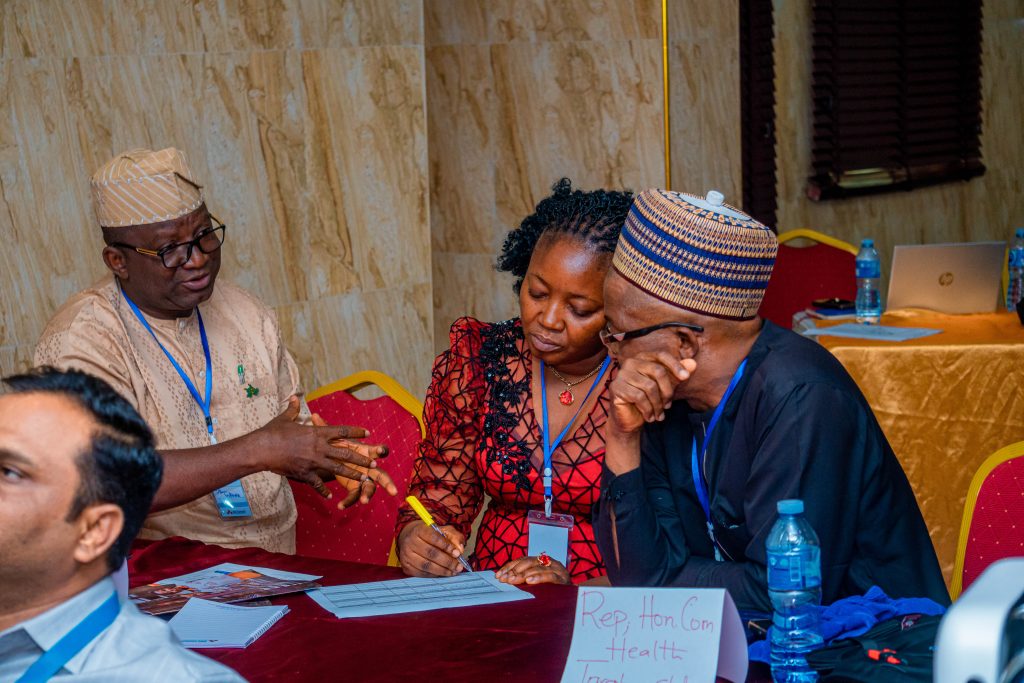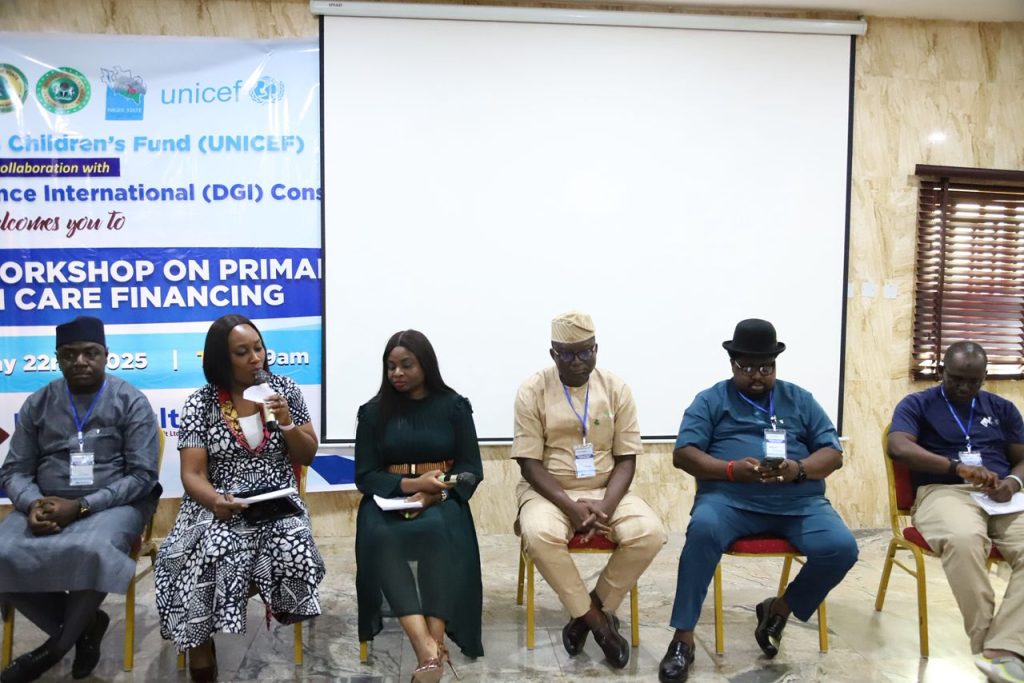Reforming public health expenditure is crucial for Nigeria’s health policy goals, particularly in achieving Universal Health Coverage (UHC). This requires increased budget allocations and expenditure and ensuring that available resources are efficiently and effectively utilized to improve healthcare delivery. Recognizing these challenges, Development Governance International (DGI) Consult, with funding from the United Nations Children’s Fund (UNICEF), conducted a public health expenditure analysis across eight Nigerian states. The study was conducted in two phases, with the second cluster comprising Gombe, Taraba, Niger, and Bayelsa. The study assessed health budget allocations and expenditure patterns across program areas, spending distribution by level of care, and overall efficiency in resource utilization. It also assessed the effectiveness of the GAVI Primary Health Care (PHC) Memorandum of Understanding (MoU), signed in 2022 between GAVI and the eight state governments, in catalyzing increased government investment in the health sector. To discuss the findings from this analysis, DGI Consult, in collaboration with UNICEF, convened a high-level stakeholder dissemination workshop in Abuja on May 22, 2025. The workshop brought diverse stakeholders together, including policymakers, health sector experts, development partners, and civil society organizations, who collectively reviewed the findings and discussed strategies for translating the recommendations into actionable reforms in respective states.

Rationale for Conducting the Public Health Expenditure Analysis
In a welcome address, UNICEF’s Health Specialist, Dr. Sachin Bhokare, emphasized that the goal of the GAVI PHC MOU program is to enhance basic healthcare services in 100 LGAs. The program is based on seven strategic pillars: leadership, management and coordination, service delivery, supply chain, health management information system, demand generation, human resources for health, and health financing. Its goal is to improve access, quality, and governance in the PHC space. He pointed out that the project used a three-pronged approach to health finance. This includes evidence generation & advocacy, capacity building, and health financing interventions, including health insurance across all 8 MOU States. Dr Sachin noted that the public health expenditure analysis provides valuable insights into how states are allocating and spending resources on health, particularly at the primary care level, and assesses the efficiency, effectiveness, equity, and adequacy of these investments.

Overview of the GAVI-supported PHC MoU
Dr. Emmanuel Emedo, a Health Specialist at UNICEF presented an overview of the GAVI-supported Primary Health Care (PHC) Memorandum of Understanding (MoU). He stated that the GAVI PHC MoU was established with the purpose of achieving several goals and aspirations within the Nigerian health system. Describing it as a landmark initiative, Dr. Emedo emphasized that it represents GAVI’s first-ever subnational investment in Nigeria. The initiative aims to expand access to and improve the quality of PHC services, strengthen governance and coordination, and most importantly, establish a clear transition plan from GAVI support to state-led sustainability. He further explained that the initiative also seeks to strengthen leadership and governance at the federal, state, and local levels for evidence-based policymaking and strategic planning. In addition, it aims to enhance coverage and equity in immunization and PHC service delivery, among other objectives. Recognizing the importance of conducting the public health expenditure analysis, Dr Emedo highlighted that evidence generation and advocacy through budget brief studies are mechanisms UNICEF deploys to expand access, improve quality, and strengthen PHC governance across various states.

Public Health Expenditure Analysis Findings, Recommendations and Advocacy Points
Dr. Bukola Shittu, DGI Consult’s Project Consultant presented the key findings from the public health expenditure analysis across the four states. The findings revealed all the states recorded a significant growth in health expenditure in the period under review (2019-2023). Similarly, health spending as a proportion of total state expenditure increased during the GAVI PHC-MOU implementation years. However, despite this increase, health spending as a proportion of total state expenditure was below 15% across all states. The analysis also revealed sub-optimal budget execution due to delays in approval and release of fund requisition memos.
The recommendations from the analysis highlighted the need to integrate PHC planning and budgeting from all sources into the State PHC Annual Operational Plan (AOP) and develop, implement, and track AOPs at the Local Government Area (LGA) level; the need to ensure that relevant PHC-related program budget lines are captured in the state’s and LGA budgets and leverage LGA financial autonomy to improve PHC financing. Furthermore, the creation of a digitized system to track PHC spending from all identified sources and improvement in the accountability arrangements through citizens’ participation in budget formulation, implementation, and monitoring were also recommended. Lastly, the states were encouraged to increase healthcare funding to meet the Abuja Declaration target of 15% and prioritize PHC financing in their budgets.

Translating Recommendations to Actions
The stakeholders engaged in state-specific group work to operationalize the analysis’s recommendations, enabling them to jointly develop potential solutions to improve public healthcare financing and accountability. Overall, the session enabled each state group to align its strategic goals with practical steps tailored to its specific context, toward improved health system performance.

The group session was followed by an interactive panel discussion session to share practical strategies and challenges on improving PHC and MNCH financing in the states. The panelists include Dr Lawal Maikano, Niger State Honourable Commissioner for Finance, Dr Appah William, Executive Secretary of Bayelsa State Primary Health Care Board, Dr. Tukura Nyigwa, Executive Secretary of Taraba State Primary Health Care Development Agency, Dr Bolanle Olusola-Faleye of Abt Global and Barrister Sani Ahmad Haruna, Gombe State ALGON Chairman. The panel session was moderated by Dr Chinekwu Oreh, Senior Health Specialist at the Nigeria Governors’ Forum (NGF). The panel session highlighted the need to explore innovative financing mechanisms, such as health taxes and direct-charge budgeting, to improve PHC financing. It also emphasized the importance of stronger data systems and evidence-based planning, as well as effective state-LGA collaboration and capacity building for effective PHC budget planning and implementation, particularly in light of LGA financial autonomy. Among other recommendations, the session also addressed the need for improved PHC financing.
What next?
At the end of the workshop, state governments were encouraged to implement the workshop’s recommendations, adopting the tailored action plans from their group work to drive continuous improvements in PHC and MNCH financing to optimize service delivery in their respective states.
Comments are closed.